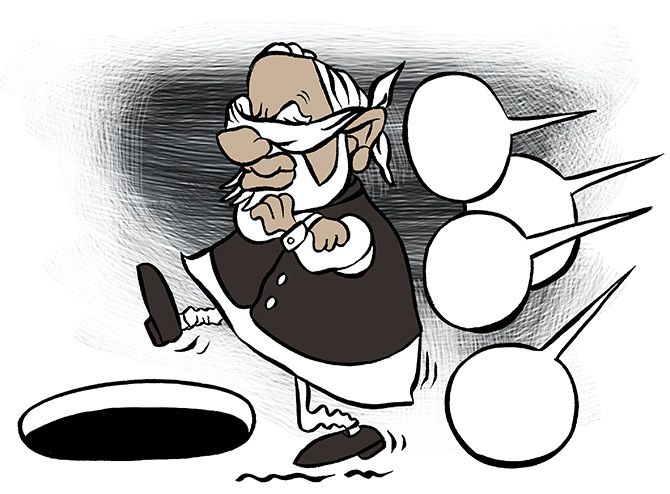Listening -- really listening -- to advisers in the government and outside would help.
India has plenty of wise economists who have worked within the bureaucracy during previous crises, points out Rahul Jacob.
Illustration: Uttam Ghosh/Rediff.com

Most central bankers have an elliptical, roundabout, speaking style.
By contrast, Raghuram Rajan, when he was governor of the Reserve Bank of India, was both an enthusiastic educator and remarkably direct.
Speaking to The Wire last month, his tone was funereal.
'This is a nation-threatening crisis,' Rajan said, his voice seemingly quavering over Skype, as he appealed to the government to reach out to the wealth of economic experience in India.
Mint's Micro Tracker recently showed that most macroeconomic indicators were substantially below their five-year growth trend in May.
Labour-intensive exports down by as much as 67 per cent and even new broadband subscribers in this age of do-nearly-everything-from-home are down by 25 per cent.
In a research note last month, another perennially prophetic voice, Credit Suisse's Ashish Gupta, estimated that Rs 2.5 trillion in corporate debt had already been downgraded, making 'refinancing challenging'.
Banks turned risk-averse months before the Covid pandemic, and the infusions of liquidity from the energetic RBI has done little to change that.
More than 90 per cent of new loans have gone to corporates with rock-solid ratings.
The moratorium for interest payments has meant that banks have sent out ready reckoners to companies of how dauntingly large their accumulated interest payments would be in the future.
An interest waiver, with the expense borne by the government, would have been a better route.
There are no easy options.
India limped into the Covid pandemic with too many pre-existing 'comorbidities'.
Many non-banking financial companies will emerge even weaker.
Debt funds with lower-rated securities of such companies have seen outflows over the past few months with money diverted to equity markets instead.
Our public sector banks began the year with the worst non-performing loan ratios in Asia.
Gupta calculates that 70 per cent of India's lending capacity is constrained.
That calculation includes lending from public sector banks (excluding State Bank of India), NBFCs and small private banks.
His assessment also factors in that the route for most companies to external commercial borrowing and bond market financing is blocked.
In the real economy, the picture was already ugly; we now have customs officials in India and China valiantly doing their bit to disrupt critical supply chains for Indian enterprises.
In the past couple of months, I have interviewed factory bosses, mid-sized exporters and restaurant owners as they variously dealt with cancelled orders from overseas, a collapse in domestic demand and the grey zones of ever-changing lockdown/unlock regulations from the bureaucracy.
I sometimes struggled to get busy people off the phone; they were so depressed that even speaking to a journalist seemed like psychotherapy.
When the debris of this economic earthquake settles, many business owners predict India will have lost export market share to Vietnam and even China.
Revenues for Chinese enterprises for the second quarter (based on April and May data) show a 35 per cent increase, compared with the first quarter of 2020.
On June 29, Vietnam surprised forecasters with a marginal 0.4 per cent increase in second quarter GDP.
Vietnam's Covid case count stands at about 372 with zero deaths. (Vietnam, with a population of 95 million, spends 6 per cent of the GDP on public health versus India's 1.5 per cent.)
Vietnam is thus open for business, while India's business hubs centred around Delhi, Ahmedabad, Mumbai and Chennai oscillate between lockdowns and less severe lockdowns.
The World Trade Organisation projects trade will decline by 13 per cent to 32 per cent this year with a recovery next year uncertain.
The only real green shoots will be when a vaccine becomes widely available, hopefully in 2021.
In the meantime, bankruptcies are bound to ripple across the economy.
The government has neither put enough money in the hands of its poorer citizens nor helped its smaller firms who make up the major share of employment.
Even in rural India, income support of Rs 500 a month is a paltry sum.
If the government simply paid what it owes in dues to exporters and other small and medium enterprises, that would amount to anything from Rs 2 trillion to Rs 5 trillion.
The risk is that such parsimony means the government is deepening the recession rather than arresting it.
The head of Larsen & Toubro expects central and state capital expenditure to be cut by Rs 4 trillion this year.
Taken together, this has been logic-defying fiscal management.
Reports that the government is to monetise part of its deficit are welcome.
Listening -- really listening -- to advisers in the government and outside would help.
From Pronab Sen to Shankar Acharya, Vijay Kelkar to Ajay Shah, India has plenty of wise economists who have worked within the bureaucracy during previous crises.
We need them more than ever. Our combined economic crises amount to a war without end. The progress we have made since 1991 is at risk.












 © 2025
© 2025